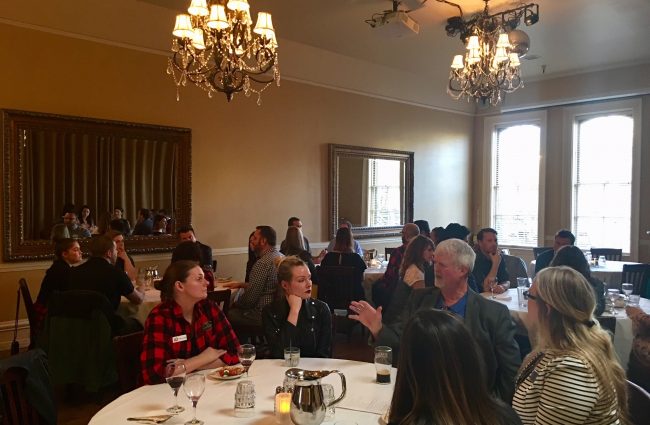 Jim DuPlessis (left), Natasha Chilingerian and Marc Rapport meet at Bourbon.
Jim DuPlessis (left), Natasha Chilingerian and Marc Rapport meet at Bourbon.
One of the strangest experiences in life is returning to a place – one where you made significant memories, formed meaningful relationships, and endured ups and downs – after a long period of time and remembering moments you may have otherwise kept buried forever.
I had this experience last month during a nine-day trip to Columbia, S.C., where I lived from 2007 to 2010 and hadn't visited for seven years, to visit my aunt and uncle who moved there two years ago from San Francisco to enjoy a low-key retirement. The bizarreness of the situation really hit me when I walked into one of the local bars I used to frequent, The Whig, with my old roommate and suddenly felt familiar with every square foot of the place, down to each piece of animal skull wall art.
Recommended For You
As a location-independent professional, I was able to spend the week reminiscing about my time in the Southern city without missing a day of work. So in between eating shrimp and grits, catching up with old friends and spending time with my family (and their three cats, including a grey kitten named Patches, who I fell head over heels for), I kept up with all my day to day duties for CU Times. I also spent some time collaborating with our reporter Jim DuPlessis, who lives in town, and my long-time friend/colleague Marc Rapport (a former CU Times staffer and current senior writer/researcher for Callahan & Associates), who is also Columbia-based. The three of us met one afternoon at a happy hour hot spot, Bourbon, and one morning at a local coffee shop, Drip; after coffee, Marc and I worked from SOCO, a co-working space for creative professionals (and oddly, the former site of a mental institution's bakery).
 Working on a CU Times print issue in Columbia with kitten Patches.
Working on a CU Times print issue in Columbia with kitten Patches. I realized that incorporating work-related tasks and conversations into a lifestyle of travel, exploration and social connections makes work feel a lot less like work. It breaks up the mundaneness of following the same routine in the same place, day after day. The exposure to new people and settings can inspire new ideas. And as long as you're self-motivated and logistically prepared to do your work on the road, it won't affect the quality of your work – in fact, the rejuvenating effects of travel can refresh you mentally, leading to better work.
Of course, due to job limitations, family obligations and other factors, not everyone in the credit union industry can take their work with them across the country on a whim. But what they can do is liven up their weekday routines by attending local events with other CU professionals (or starting their own).
 Portland CU professionals discuss industry challenges at an executive roundtable.
Portland CU professionals discuss industry challenges at an executive roundtable. Two days before taking off for the South, I participated in a Young Credit Union Professionals of Oregon and SW Washington's (YCUP) executive roundtable in Portland, which was not only a great networking opportunity, but a chance to gain insider knowledge on the biggest issues facing CU executives today. Young professional attendees sat at round tables while executives moved from table to table to discuss their career paths and everyday challenges. These were my biggest takeaways from the conversations at my table:
In HR, retention is a problem. One HR executive said his biggest challenge is getting employees to stay long-term. If you're feeling the same way, consider what your credit union can do to demonstrate to rookie employees that a path to a rewarding career is available within your organization.
Big banks are your competitors – not other CUs. What's holding credit unions back from taking away more market share from banks? According to a chief experience officer at the YCUP event, it's the fact that many CUs view other CUs, not big banks, as their competitors. One selling point that credit union marketers should use more, he added, is the fact that thanks to shared branching, credit unions are the only financial institutions with branches in all 50 states.
A brand refresh can be very powerful. Trailhead Credit Union in Portland completed a full brand refresh and name change (it was previously called Northwest Resource Federal Credit Union) to fit the city's outdoorsy, quirky vibe. An executive from the CU told attendees that the effort resulted in loan growth and membership growth, and lowered its average member age from 51 to 44.
Whether you're rooted in one place or always on the go, introducing new people and experiences into your work life can inspire creativity and business solutions. If you have any unique ideas about how to make work feel less like work, please share them with me in an email.
 Natasha Chilingerian
Natasha Chilingerian Natasha Chilingerian is managing editor for CU Times. She can be reached at [email protected].
© 2025 ALM Global, LLC, All Rights Reserved. Request academic re-use from www.copyright.com. All other uses, submit a request to [email protected]. For more information visit Asset & Logo Licensing.






